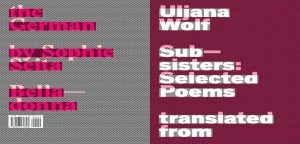Review by Jennifer Martelli
In “Annalogue on Oranges,” Uljana Wolf writes, “ . . . . all travels are possible. / All ways of the voice that lead across it, are good” (69). As I read Wolf’s Subsisters: Selected Poems, I was constantly reminded that this collection is a translation of work by a translator. In translator Sophie Seita’s introduction, she refers to Wolf’s work as “the threshold of translation, on the Ellis Island of language” (7). Throughout this hybrid book of poems and prose, “English words are allowed to appear in the German text but not as loanwords with a visitor’s pass” (7). Thus, there were border crossings of language—“lengevitch”—throughout the collection. Subsisters is a collection in constant motion, across the page and across the mother tongue, liquid and feminine.
The sense of movement influences the book as a whole. Early on, I misread the word motion for molten: “She stays in motion when she holds onto the original language and
paces ahead mimetically into a new language” (7). The words bleed and travel across pages; the translations are not pure, word-for-word. In “Second Speech, With a Conjoined Twin,” Wolf writes, “when the spleen of one flowed over into the other’s/overfull sorrow-sieve—did they then translate each other” (22). The poem—in English translation and in German—spills down the page:
the early fish, fruhen fische,
fische the fish
poisson, poisson,
poison poison.
As a mono-lingual reader, my eyes are drawn to the original German when I see words I recognize; my mind then finds meaning in a different “false-land.” The word melding/melting that Wolf uses throughout the “Subsisters” section mimics subtitled moves, where the eye and the mind must be in constant engagement. In this section, Wolf groups prose poems, allowing the “translations” to blur and flow like a river. For example, in “Subsisters, II,” the first poem begins with the line, “barbara’s back. booked. signed, and blasé,” the next, “barabara is backed. both fort and da. that’s the catch,” and then, “Barbara ist zurück. hooked, caught and cooked” (41-3).
The sense of boundary crossings is not only liquid, but female. In “Babeltrack (notes on a Lengevitch),” Wolf describes language in terms of child-rearing on an island:
and language of this island makes calor, and
the language of the child still makes sucking-sounds, soon
speech sounds, and in the snippet-language of the one typ-ing among them bubbles form . . . .
floats—preg-
nant with meaning above the afternoon, once they acquire
their mother-tongue, the bubble pops. (140)Wolf interlaces the water state of motherhood with language playfully in “Babeltrack,” introducing/underscoring the entanglement of languages, a Tower of Babel, tongue-tying the speaker who, while her child slumbers, notes “how everything’s interlaced,” playing with words, “let myself be led a-vey, ah weh where war ich, and water, / shall I go in, my first time in the atlantic . . . .” (150).
The intricacies and intimacies of interlacing—lace-making—in “Spitzen, “ a section devoted to this craft, are the threads that pull languages and relationships together.
while they sit at their lace-work chit
chatting the women tattled and gossiped . . . .
die frauen tattern die schiffschen rattern their teeth
what did they tattle about what did they need etc. (90-92)This section especially entwines female physicality and sexuality to the translations:
the tatting shuttle or schiffschen der augenspitze
is thumb-sized & resembles a small fold
mon dieu une petite occhi-pussy . . . .
such delicate & slender textures (88)Wolf’s poetry entwines and moves within the liquid pulses of the body. “I don’t mean objectively countable metrical feet,” she writes in “Faux-Amis Footprints,” “but the rhythmic-kinaesthetic imprint which a line of verse leaves behind with its . . . . cadences, in my body” (168). The poetry in Subsisters requires continuous movement of the body—eye, tongue, mind—which sways from one language to the other, across the page and across oceans. Ulana Wolf demands emotional navigation from the reader, “translation, then, is about departure, a practice of ‘transformations and good byes’” (176). Subsisters: Selected Poems requires a farewell to our mother-tongues, leaves us in a new place, transformed.
Subsisters: Selected Poems
by Uljana Wolf
translated from the German by Sophie Seita
Belladonna, 2017, $18 [print] ISBN 9780988539976
186 pp
Jennifer Martelli is the author of The Uncanny Valley and Apostrophe, both from Big Table Publishing Company. Her chapbook, After Bird, is forthcoming from Grey Book Press. A recipient of the Massachusetts Cultural Council Grant in Poetry, Martelli is also a reviewer at Up the Staircase Quarterly.

